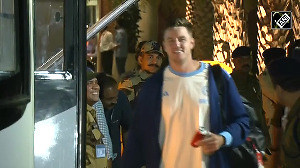Let us ignore accusations about it being a 'thank you' to Non Resident Indians who contribute handsomely to the Bharatiya Janata Party's coffers.
Let us forget charges that dual citizenship is a sop being handed out to select nations just to encourage further investment not just in the party, but perhaps also the nation.
And let us overlook the fact that the finance and foreign ministers were heckled by the 2,500-plus audience, including journalists and special interest groups from overseas, mostly complaining that their views were not being heard.
To criticize it would be easy. The list of grumbles and gripes -- from both delegates and the government -- about the event is long, and most are relevant concerns.
Let us instead focus on what the three-day Pravasi Bharatiya Mela in New Delhi from January 9 actually achieved.
One, it brought together 1,946 Indians living in 66 nations under one roof. From places as far away and as exotic as Martinique, Uzbekistan and Benin. That was on day one. The delegates reportedly crossed the 2,000 mark on days two and three. Making it the largest gathering of non-resident and ethnic Indians ever.
Two, the government, at the level of the prime minister and his deputy sent out a message to Indians across the globe that India had decided to honour and remember the great Indian Diaspora. It also emphasised this was not a one-off thing. Both the conference and the Pravasi Bharatiya Samman awards had now become institutionalised and would be an annual feature.
Three, despite the chaos and mismanagement, it gave the delegates, or least a preferred few, a chance to network with the government and each other, which can only be a good thing.
Four, it gave Finance Minister Jaswant Singh the chance, in his own words, to announce -- rather than send out a standard press release -- the substantial easing of overseas investment rules for both the private sector and individuals.
(The number of people scrambling to be photographed with the prime minister, deputy prime minister, finance and foreign ministers was quite interesting, since there were as many resident Indians as non resident ones jostling to get in the frame.)
"I don't I think I will come again since all I heard were boring speeches, but on the flip side, I am returning with a list of relevant people who can help me decide whether or not to invest in India," summed up a delegate from the US who had come specifically for the session on health care and pharma.
This, despite some sessions, like the one on 'opportunities in defence and internal security research and development,' which were impeccably managed and moderated, and also allowed fruitful debate and interaction between the audience and the panelists, proving it can be done.
Five, if the idea was to encourage debate and discussion, the government perhaps got a bit more than it bargained for, with delegates publicly accusing the Indian government of ignoring the plight of ethnic Indians, like in Fiji as well as non-resident Indians working in the Gulf and North Africa, while wooing those in the developed countries. But again, this allowed the government to learn about, and perhaps assuage and address, the genuine concerns expressed by these groups.
Six, the media hoopla alerted and educated the resident Indian about their 20 million cousins spread over the world. This is important since negative, stereotypical images about NRIs exist in the minds of many Indians.
And finally, if nothing else, it gave Pandit Ravi Shankar and Ustad Bismillah Khan a chance to put together a scintillating performance.
But do these benefits justify the millions spent by the government and FICCI on this gala affair, which had the general air and feel of a mela rather than a dignified convention?
Yes.
It is important to remember this was a first of a kind event, and provided the organisers learn from their mistakes, subsequent events are bound to be better and more effective.
And even if the money spent -- conservative estimates put the figure at Rs 15 crore -- was not partially recouped by the increase in tourism and hotel revenues, it should not be written off as a loss just yet, since the returns could take some time. It is difficult to put a price on intangible benefits which are bound to be spin offs.
But the government might consider setting up a donation-based corpus for subsequent events, with scrupulous and public records, of course.
The government also needs to ensure that the ideas and emotions collected during this event are collated, debated, and acted upon swiftly.
There was a distinct clash between economic and emotional interests during this first event, and steps must be taken to see that both are leveraged to India's advantage.
Emotional bonds with the country of origin are easy to understand. The fact that many third and even fourth generation Indians thronged the meet put paid to the theory that these bonds fade with each passing generation. Events like these prove the clichéd adage that you can take an Indian out of India, but you cannot take India out of an Indian.
But emotions alone are not enough. People will not invest in India just because they or their forefathers left these shores years ago. It might make them think about it, but the money will come only when they are sure that they can get adequate returns on it.
And that can only be achieved by projecting a stable economic and political climate, and the continued reassurance that these investments were not subject to the whims and fancies of successive governments.
Enter the prime minister who valiantly asserted that the government was not interested in just money, but in leveraging the great talent and abilities of the Diaspora, in varied fields.
Enter the home minister who stressed on India's secular fabric and traditions and described Gujarat as an 'aberration' never to be repeated.
Enter Finance Minister Jaswant Singh and his sops for Indians abroad willing to invest in specific sectors, a small but significant step, and his promise that his Budget would hold other proposals and sops.
Enter Foreign Minister Yashwant Sinha whose appeal to emulate the Jewish and Chinese Diaspora went down well with the audience, though it provoked South African Fatima Meer, a Samman recipient who championed the anti-apartheid movement and has written books on Gandhi and Nelson Mandela, to declare she hated the word 'Diaspora.'
But all these gestures, all these efforts, will come to nought if the government does not actively ensure that the initiative does not fizzle out to become yet another annual Delhi do, where hot air rules.






 © 2025
© 2025